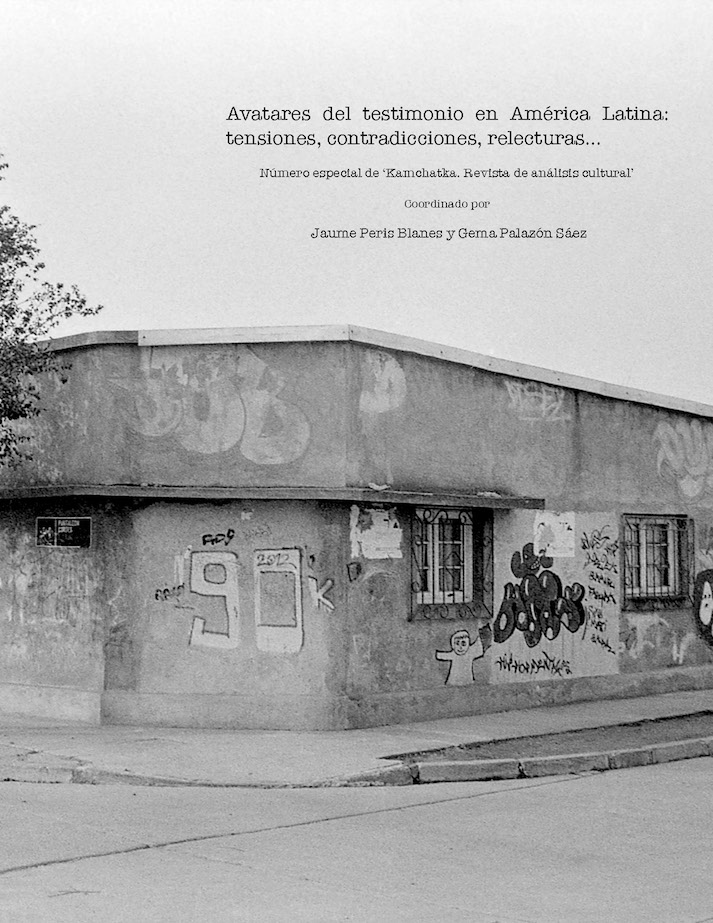Testimonio documental sandinista y narratividad: reflexiones a partir de 'Todas estamos despiertas' de Margaret Randall.
DOI:
https://doi.org/10.7203/KAM.6.6928Keywords:
testimonio, memoria, revolución sandinista, autoridad, subalternidad, literatura testimonial, Margaret Randall Abstract
Abstract
Resumen: Este artículo propone que en las narrativas testimoniales sandinistas se puede advertir localizaciones de enunciación diversas, por razones de género, clase, o calidad gubernativa de los narradores. De entre tal diversidad, se opta por analizar el testimonio documental de Margaret Randall Todas estamos despiertas para advertir motivos narrativos característicos, que llevan a pensar en “coyunturas testimoniales”. Estas coyunturas resultan, a su vez, fundamentales para el análisis de la cuestión de la memoria de la revolución sandinista en los contextos actuales.
Palabras clave: Testimonio, Sandinismo, Memoria, Narratividad, Historia.
Abstract: In this essay, I propose that Sandinista testimonial narratives have diverse points of enunciation, based on writer´s gender, class or localization as members of the revolutionary government. Among a diversity of texts, I opt for analyze the book of documentary narratives by Margaret Randall Todas estamos despiertas, evaluating three narratives motives linked to what I consider “testimonial conjunctures”. Furthermore, I believe that these moments are fundamental to analyze the current question of the memory of the Sandinista revolution.
Key words: Testimonio, Sandinista, Memory, Narrative, History
 Downloads
Downloads
 References
References
Bibliografía: Belli, Gioconda (2000). El país bajo mi piel: memorias de amor y guerra. Madrid: Plaza y Janés. Benjamin, Walter (2009). La dialéctica en suspenso: fragmentos sobre la historia. Santiago: LOM. Beverley, John. “Anatomía del testimonio”. Revista de crítica literaria latinoamericana. 25 (1987): 7-16. Beverley, John (2011). “Repensando la lucha armada en América Latina”. Sociohistórica. 28 (2011): 163-177. Beverley, John y Zimmerman, Marc (1990). Literature and Politics in the Central Americans Revolutions. Austin: University of Texas Press. Blandón, Erick (2003). Barroco descalzo: colonialidad, sexualidad, género y raza en la construcción de la hegemonía cultural en Nicaragua. Managua: URACCAN. Borge, Tomás (1990). La paciente impaciencia. Managua: Vanguardia. Cabezas, Omar (1985). La montaña es algo más que una inmensa estepa verde. Managua: Editorial Nueva Nicaragua. Cabezas, Omar (1988). Canción de amor para los hombres. Managua: Editorial Nueva Nicaragua. Cardenal, Ernesto (2004). La revolución perdida. Managua: anamá. Cardenal, Fernando (2008). Sacerdote en la revolución. Managua: anamá. Derrida, Jacques (2008). Memorias para Paul de Man. Barcelona: Gedisa. Desai, Radhika (2009). “The Inadvertence of Benedict Anderson”. The Asia-Pacific Journal. Franco, Jean (2002). “Si me permiten hablar: la lucha por el poder interpretativo”. Beverley, John y Achugar, Hugo. La voz del otro: testimonio, subalternidad y verdad narrativa. Guatemala: Universidad Rafael Landívar. 121-128 González Echevarría, Roberto (1998). Myth and Archive: A Theory of Latin American Narrative. Durham & London: Duke University Press. Guevara, Ernesto (2006). Pasajes de la guerra revolucionaria. Bogotá: Ocean Sur. Gugelberger, George. M. (ed.) (1996). The Real Thing: Testimonial Discourse and Latin America. Durham & London: Duke University Press. Invernizzi, Gabriel con Jesús Cebério y Francis Pisani (1986). Sandinistas: entrevistas con Humberto Ortega Saavedra, Jaime Wheelock Román y Bayardo Arce Castaño. Managua: Editorial Vanguardia. Mármol, Miguel y Dalton, Roque (1993). Miguel Mármol: los sucesos de 1932 en El Salvador. San Salvador: UCA Editores. Masuhr, Dieter (1984). Los ojos de los guerrilleros. Managua: Editorial Nueva Nicaragua. Meiselas, Susan y Rosenberg, Claire (2008). Nicaragua: June 1978-July1979. New York: Aperture. Meiselas, Susan, Richar P. Rogers y Alfred Guzzetti, eds. (2007). Pictures from a Revolution. Np: GMR Films Menchú, Rigoberta (2000). Me llamo Rigoberta Menchú y así me nació la conciencia. México: Siglo XXI. Moreiras, Alberto. “The Aura of Testimonio”. Gugelberger, George. M. (ed.) (1996). The Real Thing: Testimonial Discourse and Latin America. Durham & London: Duke University Press:192-224 Ramírez, Sergio (1989). La marca del Zorro: hazañas del comandante Francisco Rivera Quintero contadas a Sergio Ramírez. Managua: Editorial Nueva Nicaragua. Ramírez, Sergio (1999). Adiós muchachos: una memoria de la revolución sandinista. San José: Aguilar. Randall, Margaret (1977). Somos millones: la vida de Doris María, combatiente nicaragüense. México: Extemporáneos. Randall, Margaret (1989). Todas estamos despiertas: testimonios de la mujer nicaragüense hoy. México: Siglo XXI Sklodowska, Elzbieta (1992). Testimonio hispanoamericano: historia, teoría, poética. Frankfurt am Main: Peter Lang. Spivak, Gayatri Chakravorty (2010). Crítica de la razón poscolonial: hacia una historia del presente evanescente. Madrid: Ediciones Akal. Torres Rivas, Edelberto (2011). Revoluciones sin cambios revolucionarios. Guatemala: F & G Editores. White, Hayden (1987). The Content of the Form: Narrative Discourse and Historical Representation. Baltimore: The Johns Hopkins University Press.
Downloads
Published
How to Cite
-
Abstract1313
-
Artículo (Español)670
Issue
Section
License
This journal provides an immediate free access to the content on the principle that freely make investigation available to the public, which promotes an increased global knowledge exchange.
Unless otherwise indicated, texts published in this journal are under the license Attribution-NonComercial 4.0 by Creative Commons. These texts may be copied, distributed and publicly communicated whenever the publication’s author and title are quoted and whenever they are not used for commercial purposes. In any case, intellectual property of the articles and its potential economic rights entirely belong to its authors.
The full license can be consulted on https://creativecommons.org/licenses/by-nc/4.0/. We encourage authors to disseminate papers published in Kamchatka. Journal of cultural analysis electronically, in institutional digital repository or in their websites.





